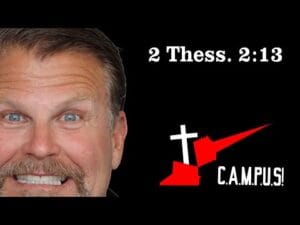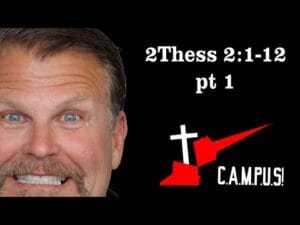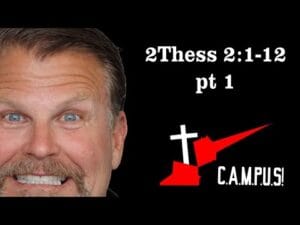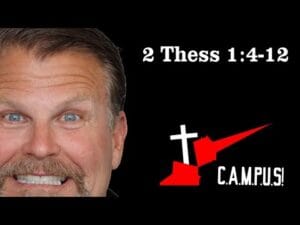
Romans 1:17-20 Bible Teaching
The Gospel is God's power and righteousness, offering salvation through Jesus' life, death, and resurrection. Faith, not works, is essential for salvation, bridging humanity's sinfulness with God's holiness.

The Gospel is God's power and righteousness, offering salvation through Jesus' life, death, and resurrection. Faith, not works, is essential for salvation, bridging humanity's sinfulness with God's holiness.

Shawn's teaching on 1 Timothy 6 emphasizes doctrinal integrity, warns against wealth's temptations, and stresses spiritual virtues over material gain, urging faithfulness.

Paul instructs Timothy on church governance, emphasizing merit-based support for elders, accountability, impartiality, and the importance of faith, good works, and spiritual discernment.

Paul's teaching in Romans emphasizes apostolic authority, believers' calling to holiness, internal peace, prayer's power, Gospel's transformative power, and salvation through faith.

Paul's teaching in Romans highlights Jesus as the fulfillment of Old Testament prophecies, linking him to David's lineage. Shawn emphasizes Jesus' resurrection as the moment he was declared "Son of God with power," illustrating a model for believers to achieve spiritual growth and authority through faith.

Paul advises Timothy on managing church care for widows, distinguishing "widows indeed" needing aid from those with family support. Emphasizes faith, family duty, and good character.

Shawn's plan covers Titus, Philemon, 1st/2nd Timothy, Mark, re-records Romans over 65 weeks, focusing on historical context, Paul's teachings, and faith's role in salvation.

Shawn's teachings on 1 Timothy 4:7-8 stress spiritual growth over superstitions, godliness over physical exercise, and maintaining faith, love, and purity for lasting rewards.

Shawn's teaching on 1 Timothy 3:16–4:6 highlights Paul's warnings about apostasy, deceptive spirits, and dietary restrictions, emphasizing historical and modern relevance.

Paul's teachings in 2 Thessalonians focus on salvation through sanctification, the importance of the Gospel, prayer's power, self-reliance, and treating straying believers with love.

Paul emphasizes church conduct and godliness mystery; Shawn critiques 1 Timothy 3:16's translation, arguing against Trinitarian interpretation, focusing on Jesus' spiritual role.

Shawn's teaching highlights election, predestination, and grace, emphasizing salvation through faith as a gift for all, with God's chosen fulfilling His purposes.

Shawn's teaching on 2 Thessalonians 2:1-12 highlights the defeat of the "lawless one" by the Lord's words, linking Nero to the Antichrist through historical and scriptural analysis.

Paul's teachings in 1 Timothy 3 highlight the moral and behavioral qualifications for bishops and deacons, emphasizing responsibility, integrity, and spiritual leadership without hierarchy.

Paul's teachings stress prayer, free will, and salvation through Christ, while Shawn's focus on modesty, gender roles, and cultural context highlights evolving norms.

Shawn's teaching analyzes 2 Thessalonians 2:1-12, focusing on the "Man of Lawlessness" and "falling away" before Christ's return, emphasizing vigilance against deception.

Paul teaches Christ's mission to save sinners, urges Timothy to uphold faith, warns against sin's deceit, emphasizes prayer for all, and respect for authority.

Paul commends Thessalonians' faith amid persecution, linking trials to God's judgment and future reward. Emphasizes justice at Jesus' return, aligning with historical events.

The teaching highlights that the Law's purpose is to guide believers to agape love, pure heart, good conscience, and genuine faith, transcending legalism through Christ.

Paul's teaching in 1st Timothy focuses on love from a pure heart, good conscience, and sincere faith, transcending the Law, which guides the unrighteous, emphasizing spiritual maturity.